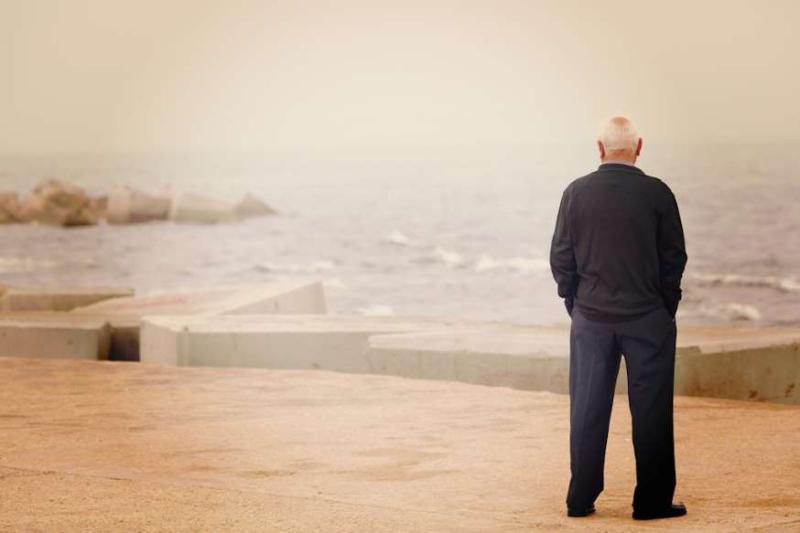This Is Biggest Regret in Life Most People Have


Everyone has regrets, but you always imagine that those regrets revolve around the mistakes that you think you made. Maybe you regret calling off your wedding . Maybe you wish you hadn’t married the man you chose . Maybe you want to quit your job and move to Bali , but you’re worried it’s the wrong choice.
We focus so much on the decisions we make in the moment, but a new study published in the journal Emotion indicates that the old adage still rings true: it’s not the things you do in life that you regret, it’s the things you don’t do.
In a paper entitled “The Ideal Road Not Taken,” Cornell psychologists identified three elements that make up a person’s sense of self. Your actual self consists of qualities that you believe you possess. Your ideal self is made up of the qualities you want to have. Your ought self is the person you feel you should have been, according to your obligations and responsibilities.
In surveying the responses of hundreds of participants in six studies, the researchers found that, when asked to name their single biggest regret in life, 76 percent of participants said it was not fulfilling their ideal self.
This indicates that we might have a flawed attitude toward how to avoid regret. We live in a world in which we are told that we’ll have a great life if we follow the rules. So you figure that if you do all of the things that society expects of you—act like a good citizen, get married at the appropriate time, make enough money to pay the bills—that you’ll feel happy and fulfilled with your life. But those are all qualities associated with your ought self, which the study found people have limited regrets about (in part because they actually act on decisions associated with it). But when it comes to your dreams and aspirations, people are more likely to let them just drift by unrealized, and that’s what really stings later in life.
“People are quicker to take steps to cope with failures to live up to their duties and responsibilities (ought-related regrets) than their failures to live up to their goals and aspirations (ideal-related regrets),” the study reads.
“When we evaluate our lives, we think about whether we’re heading toward our ideal selves, becoming the person we’d like to be. Those are the regrets that are going to stick with you, because they are what you look at through the windshield of life,” Tom Gilovich, the the Irene Blecker Rosenfeld Professor of Psychology at Cornell and lead author of the paper, said. “The ‘ought’ regrets are potholes on the road. Those were problems, but now they’re behind you. To be sure, there are certain failures to live up to our ‘ought’ selves that are extremely painful and can haunt a person forever; so many great works of fiction draw upon precisely that fact. But for most people those types of regrets are far outnumbered by the ways in which they fall short of their ideal selves.”
The results of the study indicate that it’s not enough to encourage people to just “do the right thing.” We need to establish that it’s vital for people to act on their hopes and dreams, and that it isn’t normal to just keep putting them off indefinitely.
“In the short term, people regret their actions more than inactions,” Gilovich said. “But in the long term, the inaction regrets stick around longer.”
It also implies that we need to stop making excuses for our own inaction. So learn that language you’ve always wanted to study. Take that backpacking trip through Asia you’ve been talking about for ages. Write that book that’s been tinkering around in your head for years. Don’t leave it for tomorrow. There’s only today.




“In the short term, people regret their actions more than inactions,” Gilovich said. “But in the long term, the inaction regrets stick around longer.”
Interesting article. I've been identifying my bucket list for a couple years now. My next adventure (after I muster up the courage) is to jump out of a plane. I've researched it but just haven't made the commitment yet. I'm terrified of heights so this is a personal challenge in addition to doing something I've always wanted to experience.
Learn by jumping with a static line rather than being strapped to an instructor, you learn better and it's way, way more fun.
NO FEAR, lol
Dirt dart eh?
I'm sorry but I don't know what you're trying to say.
I get it. He's saying the parachuter is the dart and you're aiming for the dirt. Dirt dart.
Ok thanks although it still seems off using the term dart to describe gently floating to the ground (barring the rare occurrence of something going very wrong)
Military humor.
You said static line which is how most learn to skydive in the military. Thought maybe you were Airborne
My bad.
Lol no, although I am military I've never jumped with them. Just don't see the fun in thundering in under a round chute carrying an extra 150lbs of gear, then forming up and hiking 10miles to your biv.
Just remember, NOT feet, butt, head on the landing.
huh? land on my head? Why does that not seem quite right.......hahahahaha
LOL.
It is the sequence of events you want to avoid.
If you jump they will probably teach you something like feet, hip, side on landing.
Better landing sequence than the other way.
Lol yes but only if the landing has gone horribly wrong, under a civilian chute it'll most likely be aim into the wind, flare about 6-8 feet off the ground and walk out the landing.
None of you are helping me with my decision! hahahahahaha
I'm more nervous than before.
Lol do it, it is the most fun and excitement you will ever have in your life with your clothes (and maybe without them (imo)). Literally heart hammering in your throat excitement. Even as I jumped more and more, freefalling, started doing tricks, going air to water, jumping never ever lost that kind of thrill.
I get the feeling from reading some of your posts that you don't shy away from things, why change now?
Well, that used to be normal. I think you are right. Chutes are much better these days.
You can do it PJ.
Yes civilian rectangle chutes are much more precise and easier to control than the old round military one's, even a novice can land as lightly as stepping off a curb.
Interesting article.
Of course, it only makes me feel worse about the things I regret... that are now no longer possible...
There's still time!
Reading your comments throughout the years I don't get the impression that you've passed on many things. You impress me.
I get what Bob is saying. I had a chance to go to Physician' Assistant School when I was in the Air Force. It would all be paid for I only had to give back 6 years.
I decided to get married instead. Yeah...I could have done both...
Just checked it on my computer. The font isn't working.
Ok. It's working for me, which is weird.
The comment was a buddhist saying "Regret is vain"
.
Not working for me either John and this isn't the first time some of your post looked like this on my screen;
Uh-oh .... the russians are hacking Johns fonts now ...... oh the humanity!
No problem. Two or three times I used fonts from an online site. I didnt know they werent showing up.
I've been luck enough to take care of quite a few people who were at the end of their life. They usually opened up about life and I just listened. Out of everyone who I was with no one said they regretted not taking a job, getting a raise, getting rid of a car etc. They always wished they had spent more time with kids, start a family, or make their family closer (like the waltons as I was told) instead of everyone ignoring each other with jobs and technology. Most at the end seemed like they just wanted to know they were leaving behind people who loved them and missed them.
Thanks for sharing. Can I ask what age group were those you helped? You mentioned "like the waltons" and I'm wondering whether answers are different for each generation.
Do you have anything you want to do that you haven't been able to fit in yet?
This was about 15-10 years ago. I'd say most were in their 50s-70s at the time. I'm a paramedic and I worked private transport at the time. Majority of my patients were dialysis pts or hospice. I got to know quite a few of them fairly well.
i did have a few people in their 30s who were terminal. Usually due to drug abuse and hep C shutting their body down.
It was pretty consistent. You had people with families... close families ... that wished they just had a few more minutes with them...
all the way to someone in their 70s who thought they wanted to be independent in their lives... no kids... no spouse.. etc
it wasn't until they were older they realized all the glamour of "single" life fades away. All the people who they thought were their friends and all they needed were gone....
it was heartbreaking to talk to someone who thought they didn't believe in a family unit or etc start realizing they weren't leaving anything behind. Their belongings would go to the state. No one would show up to their funeral... thy were alone.
I showed up to a few funerals ... it's surreal being the only one there like in the movies. They were great people... just lonely at the end
Dear Friend Silent-Hysteria: One of the things end of life pastoral care Chaplains like myself do is to be there so no one we can prevent leaves this world feeling alone.
There is no substitute for family.
That said, when people depart from this life they should not have to settle for leaving it.
They should be able to crown their existence here with the grace style and dignity in which they lives their lives, or should have been allowed to do so.
I support you in what you did.
I respect you for it.
Well done.
Peace and Abundant Blessings Always.
Enoch.